Physical Address
304 North Cardinal St.
Dorchester Center, MA 02124
Physical Address
304 North Cardinal St.
Dorchester Center, MA 02124
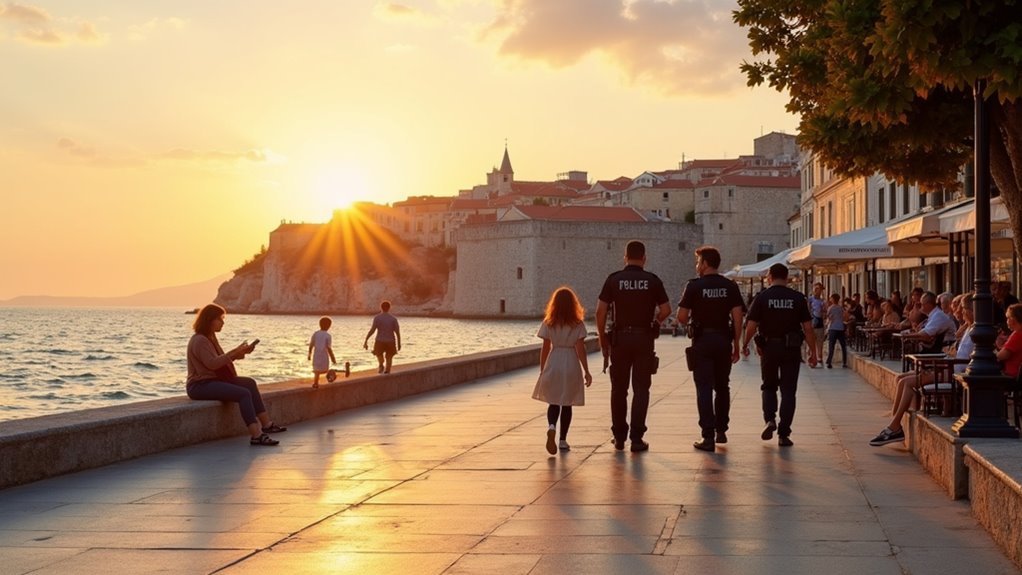
Practical safety guide reveals Croatia's impressive security status, but which unexpected hazards might impact your Mediterranean getaway?
Croatia ranks among Europe’s safest destinations, with a high global safety score of 75.1. You’ll find low crime rates, especially in rural areas, though stay alert for pickpocketing in tourist hotspots. Emergency services are excellent, with English-speaking operators available at 112. Pack water shoes for rocky beaches, follow local driving laws (zero alcohol tolerance), and dress modestly at religious sites. More practical safety tips await to enhance your Croatian adventure.
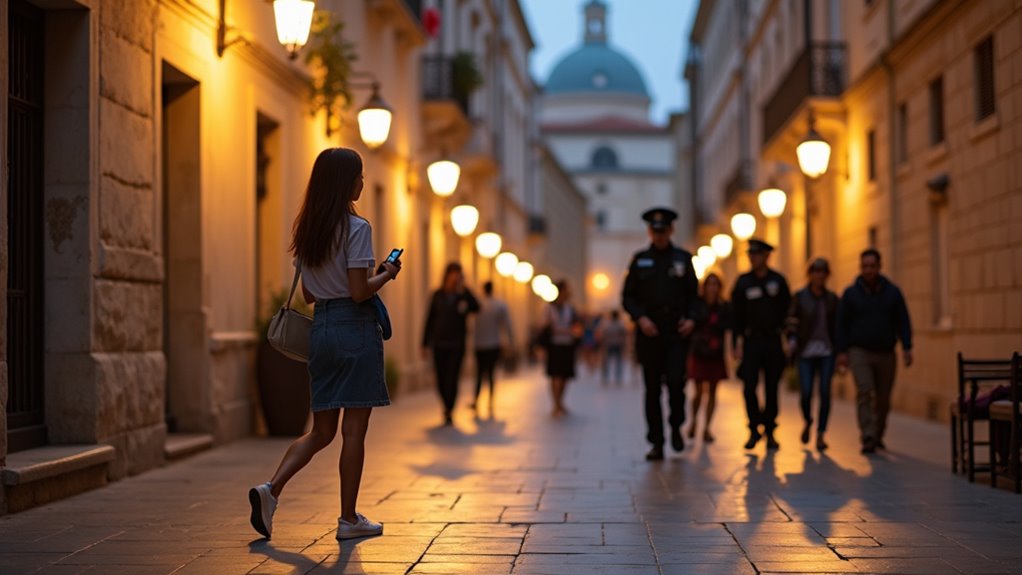
When comparing global safety metrics, Croatia consistently ranks as one of Europe’s safest destinations. The country sits at 17th globally in Numbeo’s 2025 Safety Index with a score of 75.1, outperforming even Iceland and Denmark.
Movingto’s 2025 ranking places Croatia 28th worldwide with a solid 68 rating.
Croatia’s Global Peace Index score of 1.440 puts it firmly in Europe’s top 15 safest countries. You’ll find it markedly safer than neighboring Serbia and comparable to Central European nations like the Czech Republic.
Croatia outshines most Mediterranean counterparts including Italy and Spain. When planning your European journey, you’ll find Croatia among the worry-free destinations favored by safety-conscious travelers. Croatia’s safety level is similar to Bahrain’s 75.1 rating, demonstrating its impressive standing among global safety rankings.
What this means for you: Croatia offers minimal terrorism risk, strong political stability, and remarkably low violent crime rates. Whether you’re exploring Zagreb’s streets or relaxing in rural coastal towns, you’re in one of Europe’s safest environments.
Croatia’s crime statistics paint an encouraging picture for visitors, with consistently low rates that continue to improve over time. The overall crime rate dropped by 16.76% from 2020 to 2021, with the homicide rate at just 0.81 per 100,000 people—among the lowest in Europe.
You’re highly unlikely to encounter violent crime during your visit. The most common concerns are petty thefts like pickpocketing in crowded tourist areas. Croatia maintains effective policing and specific measures to protect travelers, contributing to its reputation as one of Europe’s safest destinations. Much like Marbella’s allure for summer travelers, Croatia offers both safety and beauty for visitors seeking a worry-free vacation.
While crime rates fluctuated slightly in previous years (with increases in 2019-2020), the overall trend shows Croatia maintaining excellent safety standards. The data shows a clear peak in 2020 before declining in 2021, indicating a return to Croatia’s typically low crime levels. Most activities, especially during daylight hours, pose minimal risk to visitors.
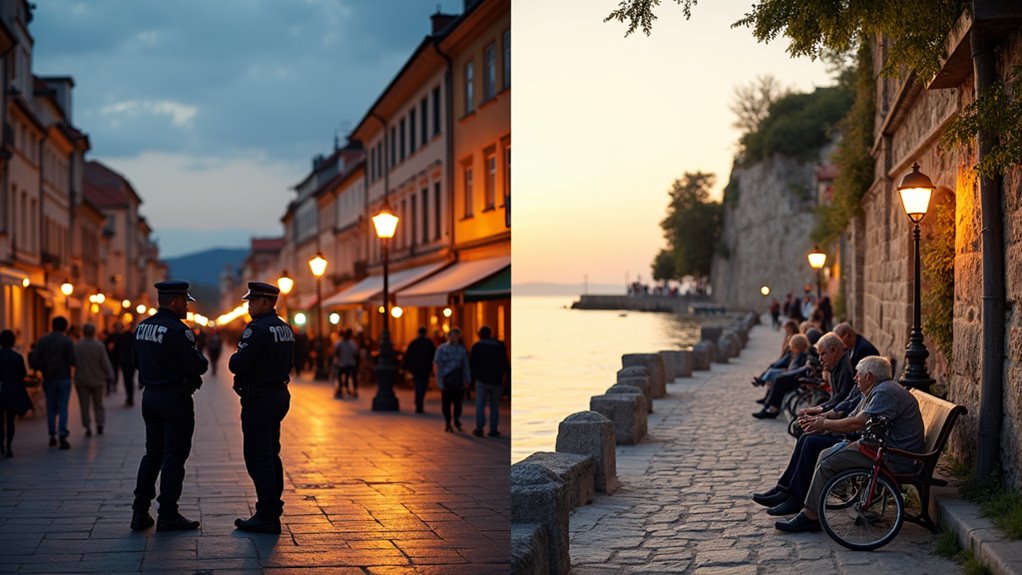
While both urban and rural areas in Croatia maintain excellent safety records, you’ll notice distinct differences when traveling between them. Cities like Zagreb and Split offer vibrant nightlife but come with typical urban challenges such as occasional petty theft and tourist-targeted scams.
Croatia’s cities pulse with energy but require urban street smarts that rural villages don’t demand.
Rural Croatia presents a different safety profile with tighter community bonds and significantly lower crime rates.
Urban areas have more reported burglaries and robberies, while rural regions require less policing.
Nighttime in cities remains generally safe, though stick to well-lit areas when possible.
Rural communities often feel safer due to stronger interpersonal connections.
Regional variations exist – Dalmatia and Istria face more property crime, while Slavonia and northern areas report fewer incidents.
Unlike Mediterranean island destinations, Croatia offers a unique blend of coastal and inland safety environments.
When steering through different settings, adjust your awareness accordingly. The country’s extremely safe travel environment allows you to explore both urban centers and countryside with minimal concerns.
Despite Croatia’s reputation as one of Europe’s safest destinations, travelers should remain aware of a few common risks during their visit.
You’ll need to watch for bar scams in tourist areas where some establishments inflate drink charges. In historic districts, exercise caution on cobblestone streets that can pose tripping hazards. During summer, beach clubs become overcrowded, particularly during festivals.
Nature presents its own challenges—jellyfish blooms periodically affect swimming areas, while summer wildfires may disrupt coastal regions. If you’re hiking at Plitvice Lakes, be prepared for flash floods after heavy rainfall. Croatia has excellent safety ratings compared to many other European destinations, but it’s still important to stay vigilant. Always wear water shoes when swimming to prevent painful sea urchin stings that can ruin your vacation.
When driving, you’ll encounter aggressive drivers in coastal cities during peak season, and unlit rural roads require extra caution at night. Always secure proper driving permits when renting vehicles to avoid legal complications.
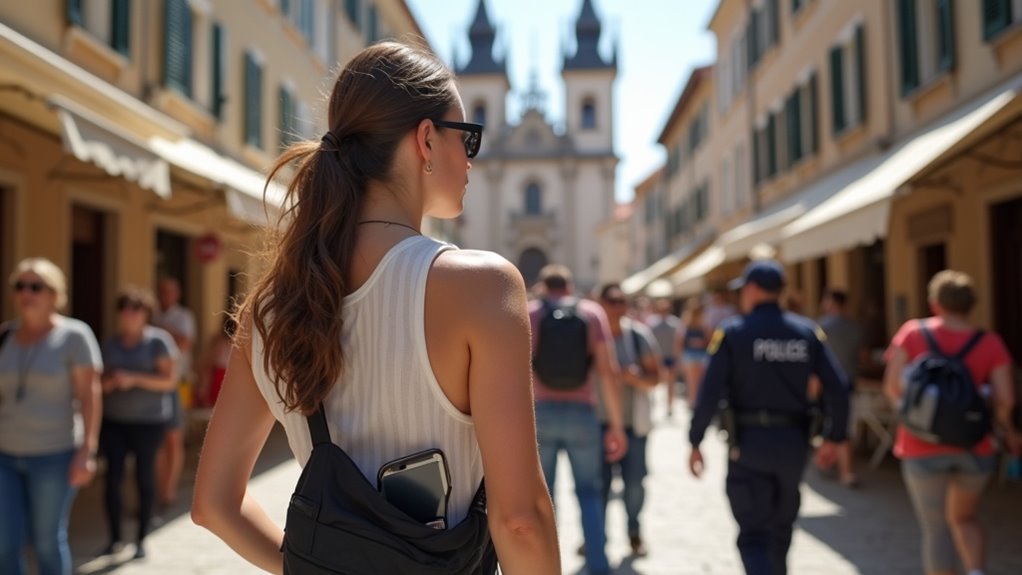
Travelers in Croatia face minimal risk of pickpocketing compared to other European destinations, though you should still remain vigilant in crowded areas. Cities like Split and Dubrovnik maintain low crime rates, but tourist hotspots naturally attract opportunistic thieves.
To protect yourself from potential theft:
Unlike some holiday destinations such as Cyprus where travelers encounter common holiday pitfalls, Croatia has fewer tourist-targeted scams to navigate.
Police respond professionally to tourist concerns, and Croatia’s overall declining crime rate contributes to its reputation as one of Europe’s safest destinations. Croatia is consistently recognized for its high safety standards that make it rank among the top 20 safest countries globally. Most travelers enjoy trouble-free visits with basic precautions.
Croatia’s remarkable nighttime safety record is prominent across Europe, with Dubrovnik and Zagreb recently crowned the continent’s safest cities for evening strolls. You’ll appreciate the well-lit pathways, visible police presence, and 24/7 tourist assistance that contribute to this distinction.
When exploring after dark, you’ll find Croatia considerably safer than popular destinations like France, UK, Germany, and Italy. The country has been recognized as the safest country in Europe for night-time walks for two consecutive years. The country’s active café culture keeps streets populated until late hours, while reliable public transport operates until early morning in major cities.
Unlike Spain, which offers family-friendly cities with different cultural experiences, Croatia focuses on overall safety throughout its urban centers. Look for designated taxi stands with licensed drivers to avoid scams, and note the emergency call boxes in nightlife districts. Croatian cities also benefit from low gun ownership rates and strict alcohol regulations that minimize public intoxication—making your evening adventures both memorable and secure.
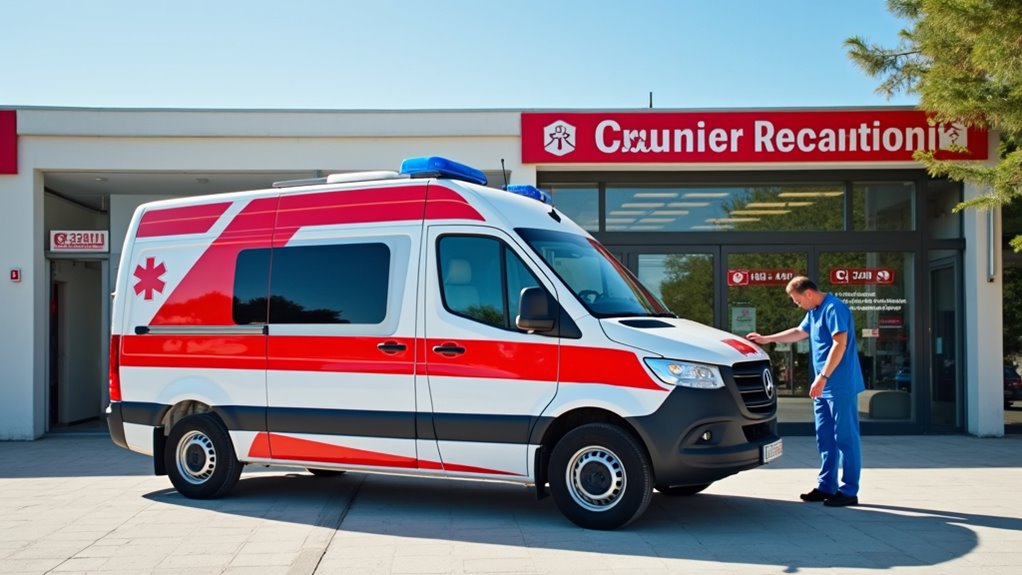
Should an emergency arise during your Croatian journey, you’ll have access to a robust network of responsive services. The primary emergency number is 112, which connects you with English-speaking operators who typically answer within 5 seconds. This number works even from locked phones or without cellular service. Croatia maintains a comprehensive emergency services platform designed to assist both residents and visitors during urgent situations.
Croatia’s medical infrastructure is well-equipped to handle tourist emergencies:
Unlike neighboring Scandinavian countries, Croatia offers excellent emergency care at more affordable rates.
Always carry your ID and insurance documentation. For vehicle breakdowns, contact HAK at 1987 for prompt roadside assistance throughout the country.
While enjoying Croatia’s stunning landscapes and coastal routes, you’ll need to be aware of some important transportation safety realities. Croatia ranks higher than many EU countries for road fatalities, with numbers increasing from 237 in 2020 to 292 in 2021.
The country’s motorways are high quality, but you’ll find urban roads particularly dangerous. Always wear seatbelts—usage rates are lower than EU averages—and remember that helmet laws are stricter here, mandatory for cyclists under 16 and e-scooter riders. Many expats looking to escape higher costs of living in Western Europe are surprised to find Spain’s affordable regions offer similar Mediterranean climates with better road safety records.
If you’re driving, note the zero alcohol tolerance for novice and professional drivers. Be especially cautious at night when accident rates increase, and watch for vulnerable road users in urban areas. Croatia provides comprehensive post-crash care data as part of their road safety profile to monitor emergency response effectiveness.
Extra vigilance is needed during winter when weather conditions can make roads treacherous.
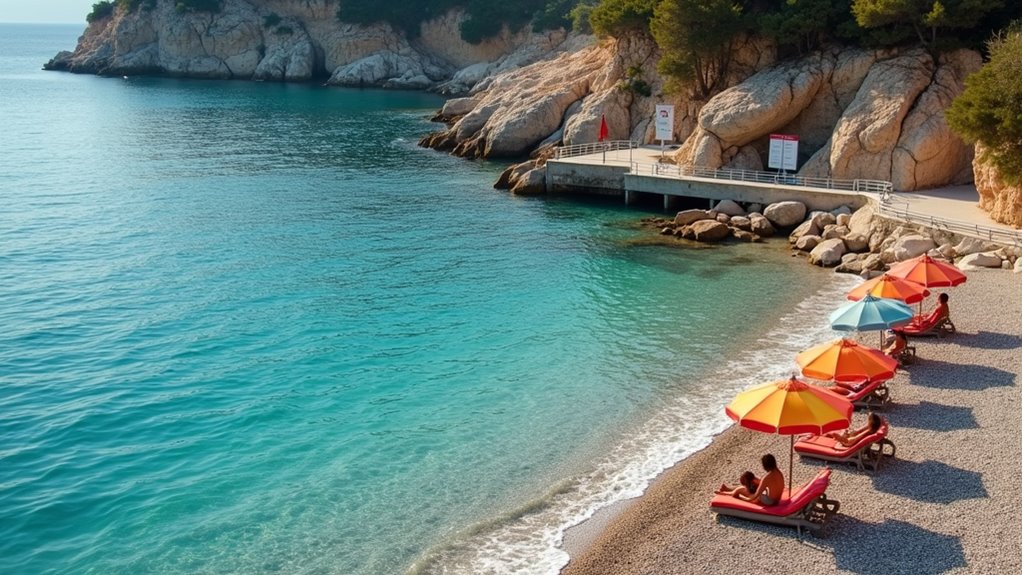
When you visit Croatia’s picture-perfect coastline, you’ll find some of Europe’s cleanest swimming waters, with nearly all beaches meeting the highest quality standards. While the Adriatic Sea is generally safe, a few precautions will guarantee your beach days remain trouble-free.
Remember that most Croatian beaches do not have permanent lifeguards on duty, making it important to exercise additional caution as part of Croatia’s low crime environment.
If you’re into water sports or boat rentals, follow local regulations and never attempt cliff jumping, as rocks may be unstable.
For emergencies, familiarize yourself with local emergency numbers and lifeguard locations.
Unlike nearby Cyprus with its nightlife adventures, Croatia’s beaches offer a more serene coastal experience focused on natural beauty.
Understanding Croatia’s cultural norms is essential for a safe and respectful visit. Dress modestly at religious sites or you’ll risk denial of entry. Never wear swimwear outside beach areas—fines reach €600, while going shirtless in town centers can cost you €500.
Respect Croatian etiquette—modest dress at holy sites, no swimwear in towns, or face hefty fines.
Remember that Croatians value personal space during conversations and prefer formal titles until they invite first-name usage. Maintain eye contact during greetings, but follow the locals’ lead on physical contact. In hospital settings, particularly after childbirth, respect the 40 days of peace traditionally given to new mothers and babies.
Croatia strictly enforces public decency laws in historic areas. Remove hats and sunglasses in churches, keep your voice down in residential neighborhoods, and follow local dining protocols. If you’re debating alternative destinations, consider that Canary Islands offer different cultural expectations regarding beachwear and public behavior.
While violent crime is rare, stay alert for pickpockets in crowded tourist spots and avoid dimly lit urban areas after dark.
Croatia is a safe bet for your next vacation. While you’ll want to safeguard your belongings in crowded areas and exercise standard travel caution, the country’s low crime rates speak volumes. Whether exploring ancient cities or lounging on pristine beaches, you’re in good hands with Croatia‘s reliable emergency services and welcoming locals. Take the usual precautions, and you’ll be smooth sailing through this Adriatic gem.